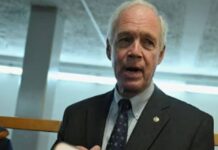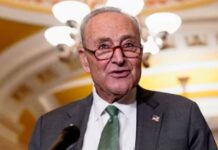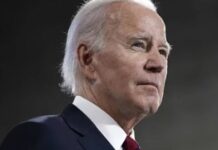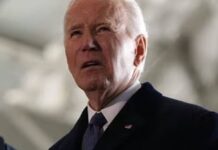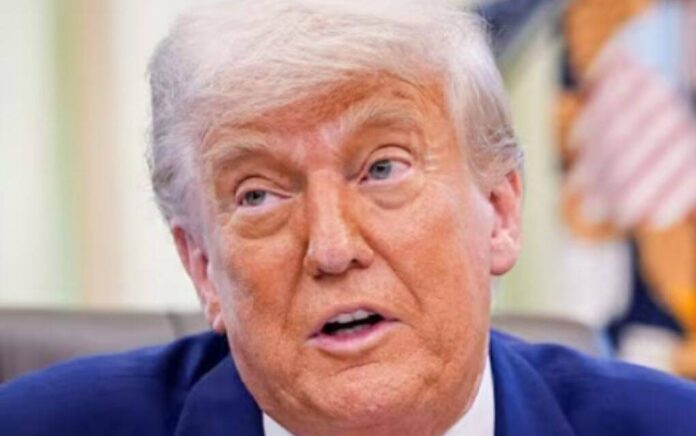
President Trump at crossroads with make-or-break decision to make
Donald Trump made many campaign promises. He wants to keep all of them.
But President Trump is at a crossroads with a serious make-or-break decision only he can make.
Trump Trying To Honor His Pledge to Avoid Endless Wars While Neutralizing Iran’s Nuclear Threat
President Donald Trump’s second term begins with a defining test of his campaign vow to keep America out of costly, protracted conflicts while confronting Iran’s persistent nuclear ambitions. As Israel intensifies its military campaign against Iran’s nuclear infrastructure, the United States stands at a critical crossroads, holding the only weapon capable of destroying Iran’s most fortified nuclear facility, the Fordow uranium enrichment site, according to defense experts cited by The New York Times report on Wednesday. The Trump administration’s ability to deliver on its promise to prevent Iran from ever building a nuclear weapon without entangling the U.S. in another endless Middle Eastern war will shape its foreign policy legacy.
Israel’s airstrikes have battered Iran’s nuclear program, crippling key components of the Natanz enrichment site and eliminating top military leaders and nuclear scientists. Yet Fordow, buried deep beneath a mountain near Qom, remains unscathed, as confirmed by the International Atomic Energy Agency. Military analysts assert that only the U.S.-developed Massive Ordnance Penetrator (MOP), a 30,000-pound “bunker buster” bomb, can penetrate Fordow’s formidable defenses, a point emphasized in the Times report. This unique capability places the U.S. in a pivotal role, even as Trump seeks to avoid direct military engagement.
The GBU-57 MOP, encased in dense steel alloy, is designed to punch through at least 200 feet of reinforced concrete or rock before detonating, making it tailor-made for targets like Fordow. “This is really what it was designed for,” Mark Cancian, a former Pentagon official and senior adviser at the Center for Strategic and International Studies, told the Times. The U.S. invested $400 million to develop this weapon, maintaining a stockpile of approximately 20 MOPs, deliverable only by B-2 stealth bombers. The precision and power of this weapon is unique to America’s military equipment and capability.
Former U.S. defense officials estimate that neutralizing Fordow and Natanz could require at least six MOPs, highlighting the operation’s complexity. While Israel has devised its own plan to target Fordow, a senior Israeli military official acknowledged that a U.S. strike using an MOP would provide the “highest confidence of success,” according to William Wechsler, a former deputy assistant secretary of defense under the Obama administration, speaking to the Times. This assessment reinforces the strategic necessity of U.S. involvement, should Trump opt for a decisive strike to uphold his commitment to stopping Iran’s nuclear program.
Trump’s campaign promise to steer clear of expensive, endless wars resonates with Americans weary of decades-long conflicts in the Middle East. His supporters view his foreign policy as a pragmatic departure from the interventionist approaches of past administrations, prioritizing American interests and resources. By considering a targeted strike on Iran’s nuclear facilities, Trump could fulfill his pledge to prevent Iran from acquiring nuclear weapons without committing ground troops or initiating a prolonged conflict, aligning with his America-first doctrine.
The president’s rhetoric reflects his resolve. “Unconditional surrender. That means I’ve had it,” Trump told reporters Wednesday. “Then we go blow up all the nuclear stuff that’s all over the place there. They had bad intentions. You know, for 40 years they’ve been saying, death to America, death to Israel, death to anybody else that they didn’t like. They were bullies. They were schoolyard bullies, and now they’re not bullies anymore.” His words convey a determination to confront Iran’s longstanding hostility while avoiding the quagmire of another open-ended war.
🚨 LMAO! President Trump just clowned on a "reporter" for asking for specifics about a potential US strike on Iran
"You don't seriously think I will answer that question, right? 'Will you strike the Iranian nuclear site and what time exactly, sir? Sir, will you strike it? Would… pic.twitter.com/3L7tJhATdS
— Nick Sortor (@nicksortor) June 18, 2025
Iran’s Supreme Leader Ali Khamenei, however, remains defiant. “Intelligent people who know Iran, the Iranian nation and its history will never speak to this nation in threatening language because the Iranian nation will not surrender,” he declared Wednesday. Khamenei’s refusal to back down, coupled with his claim that Israel’s “American allies are stepping in is a sign of the Zionist regime’s weakness and inability,” suggests Iran’s leadership is bracing for escalation while attempting to exploit perceived divisions between the U.S. and Israel.
The U.S. has not officially joined Israel’s campaign but has bolstered its regional presence, deploying a second aircraft carrier and assisting Israel in intercepting Iranian ballistic missiles last Friday. These actions demonstrate Trump’s commitment to supporting allies while maintaining a measured approach to direct involvement. By positioning American forces strategically, the administration can deter Iranian aggression and protect U.S. interests without plunging into a full-scale conflict, consistent with Trump’s pledge to avoid unnecessary wars.
Israel’s campaign, now in its sixth day, has exposed the limits of Iran’s defenses, with hundreds of airstrikes targeting critical nuclear and military assets. Yet Fordow’s resilience exacerbates the challenge of eliminating Iran’s nuclear capability without U.S. intervention. Trump’s encouragement to Israeli Prime Minister Benjamin Netanyahu to “keep going,” paired with his sarcastic “I say, good luck” in response to Khamenei’s defiance, suggests a calculated approach—backing Israel’s efforts while reserving the U.S.’s unique capabilities for a potential precision strike.
Khamenei’s criticism of Israel for striking while Iran was engaged in nuclear talks with the U.S. highlights Tehran’s attempt to portray itself as a victim of aggression. However, Iran’s decades-long pursuit of nuclear weapons, coupled with its support for terrorist groups and chants of “death to America,” undermines its credibility. Trump’s supporters argue that his hardline stance is a necessary counter to Iran’s malign activities, ensuring that the Islamic Republic never achieves the capability to threaten the U.S. or its allies with nuclear weapons.
The MOP’s existence offers Trump a surgical option to neutralize Fordow without the need for a massive military campaign. By leveraging this advanced weaponry, the administration could deliver a decisive blow to Iran’s nuclear ambitions, reinforcing Trump’s promise to prevent a nuclear-armed Iran. Such a strike would also signal to adversaries that the U.S. remains capable of decisive action when its interests are at stake, without committing to the kind of prolonged engagement Trump has vowed to avoid.
Public sentiment, particularly among Trump’s base, favors a strong but restrained approach to foreign policy. Polls indicate that Americans are skeptical of military overreach but demand robust measures to counter existential threats like a nuclear-armed Iran. By focusing on a targeted operation, Trump can address these concerns, preserving resources and lives while upholding his commitment to national security.
The escalating conflict tests Trump’s ability to balance competing priorities: supporting Israel, countering Iran, and avoiding costly wars. His administration’s deliberations over whether to authorize a strike on Iran’s nuclear arsenal reflect the gravity of the decision. A successful operation could cement Trump’s reputation as a leader who delivers on promises, neutralizing a major threat without dragging the U.S. into another Middle Eastern conflict.
Khamenei’s vow that U.S. military intervention would bring “irreparable damage” makes escalation seriously risky. Yet Trump’s track record of unpredictable, high-stakes diplomacy—seen in his negotiations with North Korea and the Abraham Accords—suggests he may view a limited strike as a means to force Iran into compliance without a full-scale war. His supporters see this as a continuation of his deal-making approach, prioritizing American strength and security.
The MOP, a symbol of American military ingenuity, offers a path to fulfill his campaign pledge to stop Iran’s nuclear program while steering clear of the endless wars that have drained U.S. resources.


